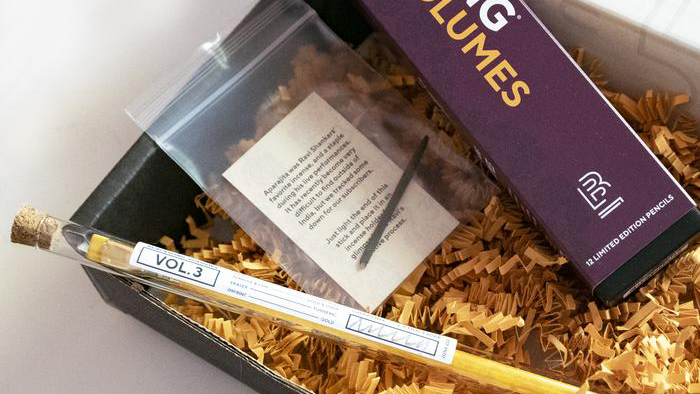Aparajita Incense and Ravi’s Performance Ritual
Each quarter, Volumes subscribers receive a 12-pack of limited edition pencils alongside exclusive curated items. Included in our most recent release is a sample of Aparajita incense, a personal favorite of both George Harrison and Ravi Shankar. The sweet smell of Aparajita incense wafting through the air became ubiquitous in all of Ravi’s performances and teachings. Not only did Ravi introduce the world to the beauty of classical Indian music, but he also taught people new ways to experience it.

Ravi Shankar was a master of Hindustani raga music, which is often described as incomparable to any western style of music. Raga exists as a framework for improvised instrumentation, it is simultaneously an outlet of artistic expression, and also a form of spiritual meditation.
As Ravi once said, “The music to us is religion. The quickest way to reach godliness is through music.”
Raga acts as a melodic prayer to help formulate a rasa, or an intimate atmosphere for musicians and audiences to explore deeper connection. A quintessential element of creating these experiences is the tradition of burning incense as a tool for relaxation and concentration.
Aparajita incense is made from a blend of different Ayurvedic herbs with notes of agar, sandalwood, musk, and amber. This fragrance filled up every philharmonic and theater he performed in. During these live performances, Ravi would line stages with these incense sticks, giving informal lectures to audiences about the ability to have transcendent experiences without the influence of drugs. He believed that the music and atmosphere of raga were enough to transform and elevate consciousness. Ravi used rituals, like incense burning, as conduits to unlock more profound levels of spirituality.
Through his performances and teachings, Ravi Shankar helped transform the way the world perceived spirituality in all things. Like Ravi’s music, Aparajita incense is more than just sweet aroma, it is a vehicle to tap into a deeper connection with mind and self.
